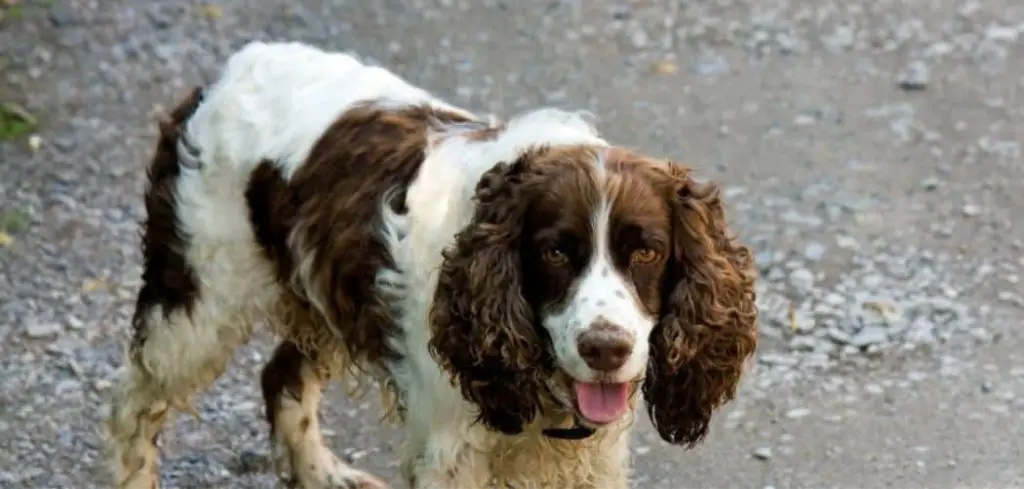When your dog suddenly throws up bile and undigested food, it can be worrying and confusing as a dog parent.
We outline what it means when your dog throws up bile and undigested food, what you can do at home to help, and when it’s time to seek veterinary care.
Dog Throwing Up Bile and Undigested Food — Why It Happens
When a dog is throwing up bile and undigested food, it usually points to problems with the stomach or digestion. This can happen if food sits too long in the stomach without moving properly into the intestines (delayed gastric emptying). It may also be due to eating too quickly, intestinal blockages, or gastrointestinal diseases like gastritis or pancreatitis.
Sometimes, bile irritates the stomach lining, making vomiting worse. In chronic cases, conditions such as megaesophagus, food intolerances, or more serious issues like tumors could be involved.
If vomiting bile and food happens repeatedly, it’s a red flag that your dog’s digestive system isn’t working as it should.

Dog Throwing Up Bile and Undigested Food: Common Causes
Gastritis
Gastritis is inflammation of the stomach lining and is a leading cause of bile-filled vomit. When the stomach becomes irritated — whether from spoiled food, toxins, or infections — it reacts by expelling contents.
This can lead to repeated vomiting of partially digested food and yellow or green bile. Dogs with gastritis often appear lethargic, drool excessively, or refuse food.
Left untreated, dehydration and weight loss can occur, making veterinary care essential if symptoms persist.
Read more: Dog Throwing Up Bile and Not Eating (Here’s what to do)
Acid Reflux
Acid reflux occurs when stomach acid backs up into the esophagus, irritating the lining and leading to vomiting.
This is often more noticeable in the early morning or late at night when the stomach is empty, causing bile to be expelled alongside undigested food.
Small breeds and older dogs are particularly prone to reflux. You may also notice symptoms such as lip licking, swallowing, or discomfort after eating. Chronic reflux can damage the esophagus, so it’s not something to ignore.
Pancreatitis
Pancreatitis, or inflammation of the pancreas, is another cause of vomiting bile and undigested food. This condition is often triggered by fatty meals, but can also arise from genetics or other illnesses.
Along with vomiting, dogs may show abdominal pain, hunched posture, and loss of appetite.
Pancreatitis can range from mild to life-threatening, so prompt veterinary evaluation is critical. Treatment often involves fasting, IV fluids, and pain management.
Dietary Indiscretion
Many dogs love to scavenge, but eating garbage, table scraps, or spoiled food can wreak havoc on their digestive systems.
This is known as dietary indiscretion and often results in vomiting bile and undigested food. The stomach reacts to irritants by forcefully expelling its contents.
In many cases, mild episodes resolve with rest and a bland diet, but frequent or severe episodes may require veterinary treatment, as toxins or bacteria from spoiled food can cause lasting harm.
Intestinal Blockage
A more serious cause of vomiting is an intestinal blockage, which occurs when a foreign object like a toy, bone, or piece of clothing obstructs the digestive tract.
This prevents food from moving normally, causing it to be expelled along with bile. Dogs with blockages may also show abdominal swelling, repeated attempts to vomit without producing much, and signs of pain.
This is a medical emergency that requires immediate veterinary intervention, often surgery.
Liver or Kidney Disease
When vital organs such as the liver or kidneys are compromised, the body struggles to filter toxins, which can trigger nausea and vomiting.
Dogs may vomit bile and undigested food regularly, along with showing signs like excessive thirst, weight loss, and lethargy.
These conditions are serious and usually progressive, requiring ongoing veterinary management. Bloodwork and imaging help identify organ dysfunction so appropriate treatment can begin.
What to Do If Your Dog Is Throwing Up Bile and Undigested Food
If your dog has a single episode but otherwise seems fine, you can withhold food for 8–12 hours, then reintroduce a bland diet of boiled chicken and rice in small portions.
Always provide fresh water to prevent dehydration. Feeding smaller, more frequent meals may also help reduce bile buildup in the stomach.
Avoid giving fatty table scraps or abrupt diet changes, as these can aggravate vomiting. If your dog is prone to acid reflux, try offering a light snack before bedtime to keep the stomach from being empty overnight. Keep garbage and harmful foods out of reach to prevent dietary indiscretion.
However, ongoing vomiting or refusal to eat should not be treated at home for long. If your dog vomits more than once in 24 hours, seems lethargic, or shows abdominal pain, veterinary care is needed. Vomiting can quickly lead to dehydration, especially if diarrhea is also present.
When to Call or Visit Your Vet
You should contact your vet right away if your dog:
Vomits repeatedly or can’t keep food/water down
Shows signs of abdominal pain or bloating
Has blood in vomit or stool
Refuses to eat or drink for more than 24 hours
Becomes weak, lethargic, or collapses
These red flags may indicate pancreatitis, obstruction, or organ disease that requires urgent attention. Your vet may perform blood tests, X-rays, or an ultrasound to determine the underlying cause and start appropriate treatment.
Read more: Dog Throwing Up Bile and Foam (Causes explained)
Key Takeaway
A dog throwing up bile and undigested food can be caused by something as simple as an empty stomach or as serious as an intestinal blockage.
While mild cases may improve with rest and a bland diet, ongoing vomiting, pain, or lethargy require veterinary care.
As a caring owner, monitoring symptoms closely and seeking help when needed ensures your dog stays safe, comfortable, and healthy.
